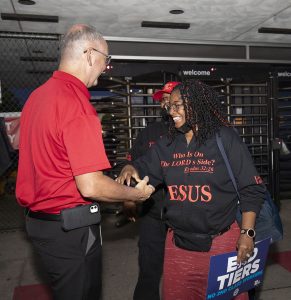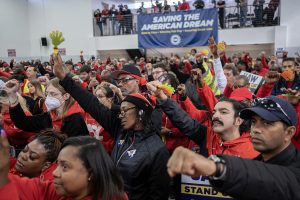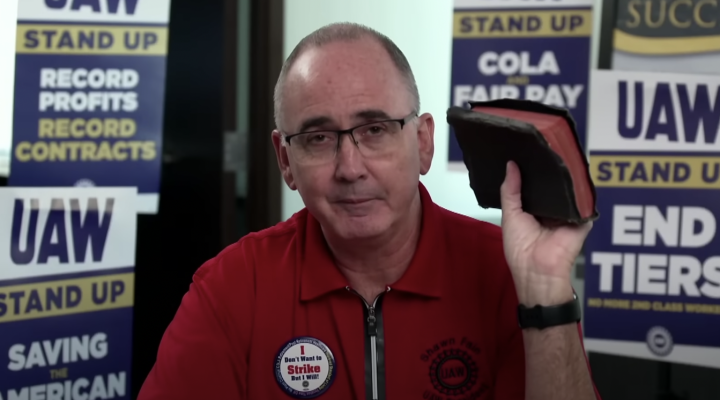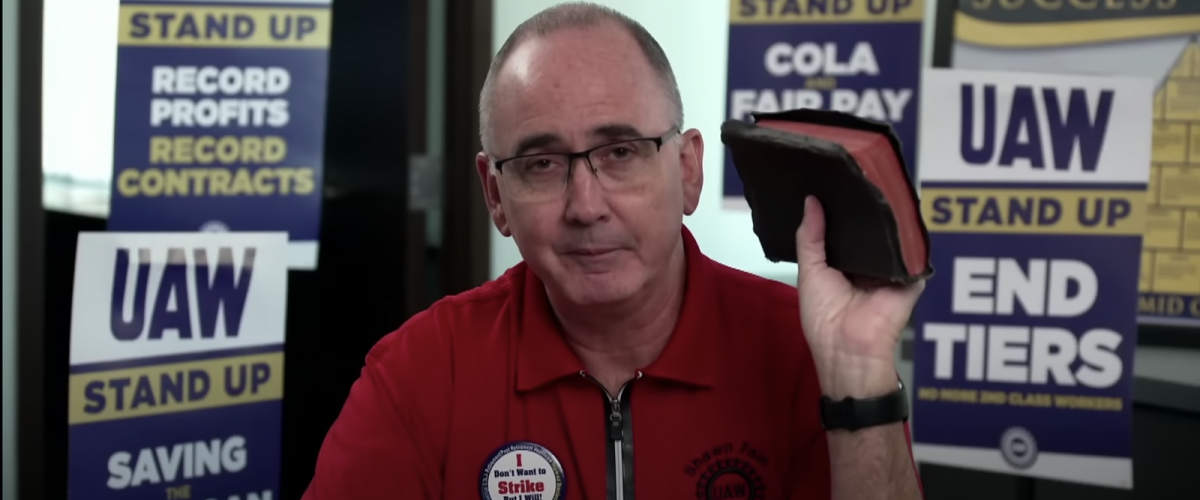In his first sit-down interview with a religious news outlet, United Auto Workers President Shawn Fain explained his faith and his reasoning for backing President Joe Biden in this year’s presidential election.
Fain has deep roots in the union community because his grandfather became a union member in 1937 and he has been a union member since 1994.
“I ended up getting into an apprenticeship in the IBEW [International Brotherhood of Electrical Workers] union, thanks to my neighbor. I worked summer jobs, in construction,” he explained. “I ended up applying for an apprenticeship in the IBEW. And that is where things really changed for me.”
Coming from a blue-collar working-class family helps him understand what many working-class Americans are facing today, he said, whether it be economic issues or changing work force need. Although he disagrees with them, he understands why many of these workers have voted for former president Donald Trump.
The message he wants to convey is to compare the two presidential candidates in how they actually listen to America’s working class.
“Part of leadership is listening. It’s not mandating, it’s listening,” he said. “That’s a big difference in Donald Trump and Joe Biden. Donald Trump just wants to bark orders and say, ‘I know everything, and you are all stupid.’ Joe Biden, you know, has his opinions and his experiences, but he listens and that’s what leadership is to me.”

Breaking with the long-standing tradition of the “handshake ceremony” with the auto executives of the Big Three auto makers to open contract talks, United Auto Workers president Shawn Fain instead speaks with and does “members’ handshakes” with Stellantis workers at the Stellantis Sterling Heights Assembly Plant on July 12, 2023, in Sterling Heights, Michigan. (Photo by Bill Pugliano/Getty Images)
Clearly, many ardent Trump supporters believe Trump has, indeed, listened to them because he echoes and amplifies their grievances. That does not mean Trump — a millionaire business owner — understands the needs of blue-collar workers, he said.
And Democrats have work to do as well, he said: For Democrats to reach workers, Democratic candidates must know who they are talking to and the struggles many of these workers face.
This same difference is one of the reasons Fain ran for president of the UAW.
“My decision to run for president in this union came from feeling very frustrated,” he explained. “I felt like our leadership was too close to the companies. I call it company unionism. I just kept watching our conditions go backward over the years. The former administration caucus structure expected you to do what they tell you and jump in line and you don’t question anybody. I decided to go on vacation, to think about what would be my next [move].”
While on vacation, things came into focus for him.
“I get up every morning and have my devotions with God. I can remember getting ready for the day and looking in the mirror asking myself if I could live with the decision not to run for UAW president.”
Christian faith has long played a key role in Fain’s life. He credits a large part of that influence to his grandmother, whose Bible he used during his swearing in.
“When I was sworn in as president, I had that Bible in my hand along with my Bible. All my grandparents had great faith. My other grandmother Carter talked to me a lot and I remember vividly standing in her kitchen one time, and her saying to me, we were talking about something, and she said, ‘Everything you need to know in life is in the Bible.’ I vividly remember that conversation, and I’m 55 now, it has stuck with me.”
His faith drove him to push for one of the largest union deals in American history, when he asked the three largest car manufacturers to increase pay for their workers. Many around him thought it couldn’t be done. Fain believed this was possible because he believed God placed him in the leadership position.
Even at UAW rallies, Fain was clear about his faith. He quoted Bible verses, often from the Gospel of Matthew.

UAW members attend a rally in support of the labor union strike at the UAW Local 551 hall on the South Side on October 7, 2023, in Chicago,. UAW president Shawn Fain joined members in solidarity with the ongoing strike. (Photo by Jim Vondruska/Getty Images)
“For the times and the situation we were in, I talked about faith a lot, and a lot of the Bible passages I quoted came from Matthew,” he recalled. “However, my favorite book of the Bible is Ecclesiastes, along with my favorite verse in that same book being 4:9-12.”
That passage states: “Two are better than one, because they have a good reward for their toil. For if they fall, one will lift up the other; but woe to one who is alone and falls and does not have another to help. Again, if two lie together, they keep warm; but how can one keep warm alone? And though one might prevail against another, two will withstand one. A threefold cord is not quickly broken.”
“That is my favorite verse, it’s our verse for our union and just for who we are,” he said. “Two are better than one, for they have a great return for their labor, if one falls down, the other can pick them up.”
Fain believes so much in the power of unions and his Christian faith that he makes a bold declaration: If given the chance, Jesus would have joined a union. To him, that’s the gospel truth.
Related articles:
What would happen if clergy unionized? | Analysis by Kristen Thomason
Q&A with Chris Sanders on unions, social justice and policing


